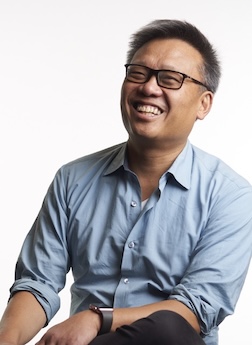Generative Biology: Learning to Program Cellular Machines
to

Wendell Lim, Ph.D.
Professor of Cellular and Molecular Pharmacology; Biochemistry & Biophysics and Pharm. Chem
Byers Distinguished Professorship
University of California, San Francisco
My general scientific interests are in understanding how genetically encoded molecular programs can yield the remarkable behaviors observed in biological organisms, at multiple scales. I began my research career as a biophysical chemist and structural biologist studying problems such as the evolutionary optimization of enzymes, how protein structure is encoded in sequence, and the determinants of protein-protein interaction specificity. My research has gradually shifted towards utilizing this mechanistic understanding of molecules as a foundation to study how systems of interacting molecules assemble to yield cellular or organismal signaling behaviors – complex behaviors in both space and time. My lab is interested in both the fundamental principles governing these molecular programs, as well as the way such programs have evolved. How to identify the most relevant functional modules at various scales of biology is an ongoing but fascinating challenge. We have also become interested in using synthetic biology and our growing understanding of molecular networks to engineer cells with novel behaviors, such as therapeutic immune cells programmed to recognize and treat cancer or other diseases. This is a tremendously exciting time for creative exploration in biology: our knowledge of the genome and of basic molecular and network mechanisms is now combined with exciting new tools for interfacing with, interrogating, and engineering biological systems.
Summary
https://videocast.nih.gov/watch=52291
Synthetic biology is a “learning by building” approach to explore the logic of complex cellular behaviors. We have been building a foundational toolkit of modular components to facilely rewire cell sensing, communication, gene expression, and physical interactions. These tools can be harnessed to program cells that execute novel therapeutic behaviors: immune cells that precisely kill cancers through multi-factor recognition or that locally deliver payloads that disrupt disease microenvironments. Cells with such synthetic circuits could be used to address diverse diseases, including solid cancers, autoimmunity, and degeneration. Such therapies are now entering the clinic. Using artificial intelligence (AI) to analyze data from diverse synthetic circuits may provide a powerful way to better understand and design complex cellular functions.
Learning Objectives:
- Synthetic biology is a "learning by building" approach to explore the logic of complex cellular behaviors. We can define minimal requirements for a particular behavior, as well as alternative solutions.
- We are building a toolkit of modular components to facilely rewire fundamental cellular behaviors, such as cell sensing, cell-cell communication, and physical cellular organization/adhesion.
- These tools can be harnessed to engineer cells with novel, therapeutic behaviors. Immune cells can be engineered to precisely kill cancers using multi-step, multi-antigen recognition. Immune cells can be programmed to deliver payloads to specific sites in the body to remodel disease microenvironments. We can also engineer cells to interact as a network to drive self-organization or development. Synthetic cell circuits are making their way into the clinic.
- Using artificial intelligence (AI) to analyze data from high-throughput synthetic biology screens may provide a powerful way to better understand and design complex cellular functions.
This page was last updated on Tuesday, February 13, 2024